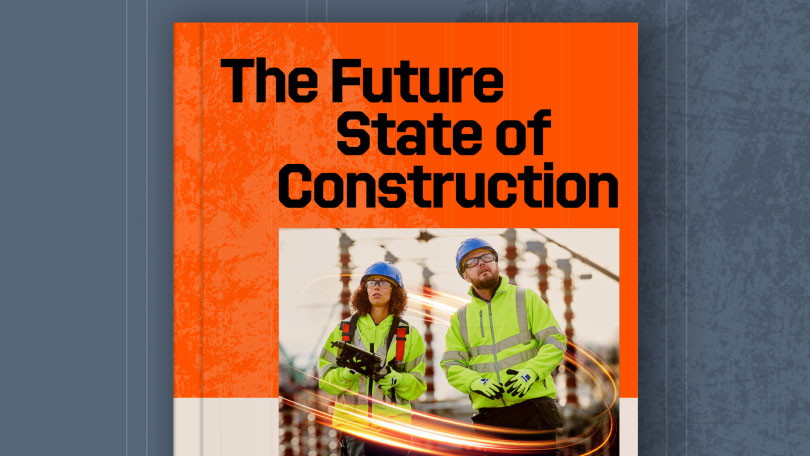— 6 min read
EPC Contractor in Construction: A Complete Guide for the UK & Ireland
Last Updated Aug 28, 2025
Samantha Nemeny
33 articles
Sam—Samantha if she’s feeling particularly academic—has spent a decade in content marketing, with eight years focused on Australia’s construction industry. She has a knack for making complex ideas easy to understand, turning industry jargon into clear, engaging stories. With a background in SEO and marketing, she’s spent the past three years at Procore, helping industry professionals navigate the world of construction with content that’s both insightful and easy to digest.

Nicholas Dunbar
Content Manager
65 articles
Nick Dunbar oversees the creation and management of UK and Ireland educational content at Procore. Previously, he worked as a sustainability writer at the Building Research Establishment and served as a sustainability consultant within the built environment sector. Nick holds degrees in industrial sustainability and environmental sciences and lives in Camden, London.
Last Updated Aug 28, 2025

Engineering, Procurement, and Construction (EPC) contractors are an important part of large-scale infrastructure projects across the United Kingdom and Ireland. These specialised firms offer a comprehensive solution for complex schemes - think Hinkley Point C, Dogger Bank Wind Farm or sections of HS2 - managing the entire lifecycle from initial concept to final handover.
Unlike a main contractor who typically manages only the build phase, an EPC contractor assumes full responsibility for engineering, sourcing materials, and managing construction, consolidating these functions under a single contract. This turnkey approach enhances cost and programme certainty, simplifies project coordination and mitigates risks, often making EPC contracts a preferred choice for complex infrastructure and industrial projects - particularly in sectors such as energy, data centres and public transport. This EPC construction model bundles design, buying-in and build under one roof, giving owners a single accountable partner.
Table of contents
What is an EPC Contractor and what are they responsible for?
An EPC (engineering, procurement and construction) contractor is a firm that delivers an entire operational asset under a single contract, reducing the need for multiple specialist contractors.
An EPC contractor’s role is typically divided into three key phases:
1. Engineering
EPC contractors begin by laying the groundwork through:
- Comprehensive feasibility studies and technical assessments
- Detailed engineering planning, including process-flow diagrams
- Ensuring compliance with CDM 2015 duties, BS EN structural codes and the latest Part L energy targets
- Developing innovative value-engineering solutions to optimise project performance and reduce costs
2. Procurement
The procurement phase is critical for project success. EPC contractors manage:
- Strategic procurement management planning
- Material sourcing from UK or international suppliers
- Sub-contractor selection through competitive tender processes
- Evaluating suppliers and sub-contractors based on quality, reliability, cost-effectiveness and delivery timelines
- Supply-chain management and inventory control
- Navigating import, customs and logistical challenges
3. Construction
During the construction phase, EPC contractors:
- Coordinate on-site operations and construction crews
- Implement stringent safety protocols in line with the HSE
- Conduct inspections and quality-control procedures to ISO 9001 standards
- Manage project challenges in real time
- Provide regular updates and documentation to project owners
By consolidating these responsibilities, EPC contractors provide owners with a single point of accountability - one throat to choke - reducing administrative complexity and project risk.
Learn about the future of the built environment - Read Procore's Future State of Construction report
Learn how contractors, subcontractors, and project teams can take advantage of new opportunities to boost efficiency and profitability over the next decade. Download the report to get your roadmap to the future state of construction.

Other Key Responsibilities
Beyond their core engineering, procurement and construction roles, EPC contractors are also responsible for:
- Risk management: Proactively identifying and mitigating risks such as cost overruns, safety hazards and supply-chain delays
- Change management: Managing modifications to scope, cost or timeline, ensuring clear documentation and communication (particularly around NEC4 compensation events)
- Commissioning: Overseeing final inspections, testing and system handovers to ensure the project is fully operational before it’s handed over to the client
In the UK & Ireland, EPC contractors have become increasingly essential for navigating the complex landscape of large-scale infrastructure development. These specialised firms are particularly crucial in strategic sectors such as:
- Energy infrastructure, where intricate technical coordination is required
- Data centres, demanding strict programme certainty and MEP integration
- Public transport, involving multiple stakeholders and rigorous regulatory compliance
By consolidating multiple project responsibilities into a single, streamlined approach, EPC contractors provide owners with a unique value proposition: a single, accountable point of contact that can effectively manage the entire project lifecycle, mitigate inherent risks and deliver sophisticated infrastructure solutions with greater efficiency and predictability.
Understanding EPC Contracts in the UK
EPC contracts are legally binding documents that outline the full scope of project delivery. Key characteristics often include:
- Fixed-price (lump-sum) agreements that provide cost certainty
- Contractor assumption of most project risks
- Alignment with UK contract forms such as NEC4 Engineering & Construction Contract or bespoke JCT Design & Build
Pro Tip
Most EPC deals are fixed-price (lump-sum), so the contractor protects its margin by managing scope tightly - a structure that gives owners sharper budget certainty and helps overcome risk-related financial - management challenges.
EPC Contracts vs. Design-Construct Contracts
EPC and design-construct contracts represent distinctly different approaches to project delivery, with varying implications for risk management, project scope and owner involvement.
For UK project owners, the choice between EPC and design-construct contracts often hinges on project complexity, risk tolerance and desired level of owner involvement. Large-scale industrial projects like energy facilities or rail infrastructure might benefit from the comprehensive risk-transfer approach of EPC contracts. Meanwhile, more design-focused schemes - such as commercial offices - may find design-construct contracts more appropriate, allowing greater collaborative input throughout the project lifecycle.
| Aspect | EPC Contracts | Design-Construct Contracts |
| Scope | Encompasses engineering, procurement and construction in one contract | Combines design and construction; procurement may be separate |
| Risk Allocation | Contractor assumes substantial portion of project risks | Risks distributed more evenly between owner and contractor |
| Owner Involvement | Limited owner input once contract is signed | Owner retains more active involvement |
| Best Suited For | Complex industrial and infrastructure projects | Commercial projects where design flexibility is valued |
Pros and Cons of EPC Construction Contracts
EPC contractors offer both advantages and potential challenges to owners.
| Advantages | Potential Challenges |
| Simplified project management through a comprehensive, integrated approach | Less design flexibility and limited scope changes once construction begins |
| Reduced project risk via a single point of accountability across engineering, procurement and construction phases | Higher upfront costs owing to risk premiums included in fixed-price contracts |
| Improved cost predictability and programme certainty | Contractual agreements can be legally complex |
If disagreements arise, parties usually rely on statutory adjudication under the UK Construction Act - a quick-fire but potentially expensive process that puts extra pressure on accurate record keeping.
EPC Contractors vs. Main Contractors
Depending on factors such as project complexity, risk tolerance and the level of involvement you want from a contractor, you might choose to hire a main contractor over an EPC contractor.
| Aspect | EPC Contractor | Main Contractor |
| Scope | Manages the full project lifecycle | Generally only manages the construction phase |
| Risk | Contractor assumes greater risk | More risk is borne by the owner |
| Point of Contact | Single accountability for design, procurement and construction | Manages construction but reports to the client or project manager who manages engineering and procurement |
FAQ - What’s the difference between an EPC and a main contractor?
- EPC contractor: Designs, procures and builds, handing over a turnkey asset.
- Main contractor: Focuses on the build; design and procurement are usually managed by others.
Choosing the Right EPC Contractor
When choosing an EPC contractor, prioritise these qualities:
- Proven experience in your sector and with projects of comparable scale
- In-house capabilities covering engineering, procurement and construction
- Safety and quality commitment evidenced by low accident frequency rate and ISO certifications
- Risk and change management methodologies aligned with NEC/JCT frameworks
- Transparent communication with regular progress reports and escalation routes
- Digital technology adoption - platforms like Procore surface real-time data, cut rework and slash risk
How Comprehensive Responsibility Changes the Client’s Role
- Governance shifts to high-level gateway reviews rather than day-to-day oversight
- Early scope freeze is essential; late changes trigger costly compensation events
- Trust in contractor expertise becomes a critical success factor
EPC Contractors Can Be a Great Solution for Complex Projects
EPC contractors offer a structured, accountable approach to large-scale projects, making them a solid option for industrial and infrastructure developments in the UK & Ireland.
While they may not suit schemes with highly flexible scopes or heavy design emphasis, EPC contracts excel on complex, risk-intensive projects where efficiency, reliability and clear accountability are paramount. When selecting an EPC contractor, prioritise experience, integrated capabilities, safety and robust risk-management processes to ensure a successful partnership.
Categories:
Written by
Samantha Nemeny
33 articles
Sam—Samantha if she’s feeling particularly academic—has spent a decade in content marketing, with eight years focused on Australia’s construction industry. She has a knack for making complex ideas easy to understand, turning industry jargon into clear, engaging stories. With a background in SEO and marketing, she’s spent the past three years at Procore, helping industry professionals navigate the world of construction with content that’s both insightful and easy to digest.
View profileReviewed by

Nicholas Dunbar
Content Manager | Procore
65 articles
Nick Dunbar oversees the creation and management of UK and Ireland educational content at Procore. Previously, he worked as a sustainability writer at the Building Research Establishment and served as a sustainability consultant within the built environment sector. Nick holds degrees in industrial sustainability and environmental sciences and lives in Camden, London.
View profileExplore more helpful resources

Integrated Compliance: A Main Contractor’s Guide to ISO 9001, 14001, 45001, and 44001
For UK main contractors, ISO 9001, 14001, and 45001 are fundamental prerequisites to any tendering activity. The Building Safety Act, Net Zero targets, and tight margins mean these certifications are...

The Main Contractor’s Action Plan for Commercial Risk
For UK main contractors, managing risk protects project margins, rather than solely acting as a compliance exercise. Construction is an industry defined by thin profits and high liability, and a...

Construction Action Plans: Minimising Risk & Maximising Delivery
A construction project is a complex set of tasks, resources, and stakeholders. Without a clear, documented path forward, even meticulous planning can lead to delays, cost overruns, and disputes. The...

Construction Drawings: Guide to Types & Regulations
While architects, urban planners and landscape designers first conceive buildings and public realms in their minds, translating vision into detailed drawings remains the foundation for any project. Construction drawings translate...
